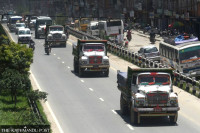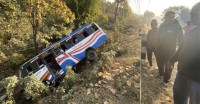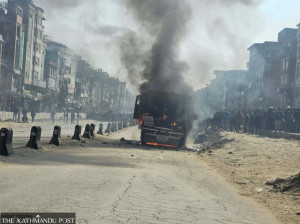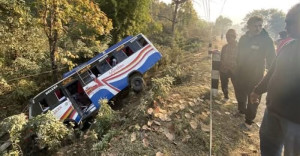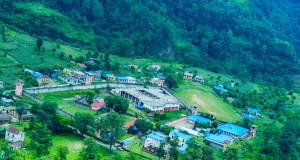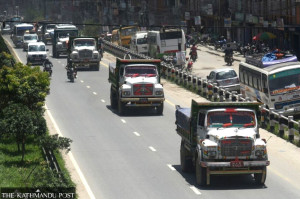Bagmati Province
Chitwan National Park once again sets settlers’ huts ablaze
The park burnt around a dozen huts in the area on Sunday while several others were demolished.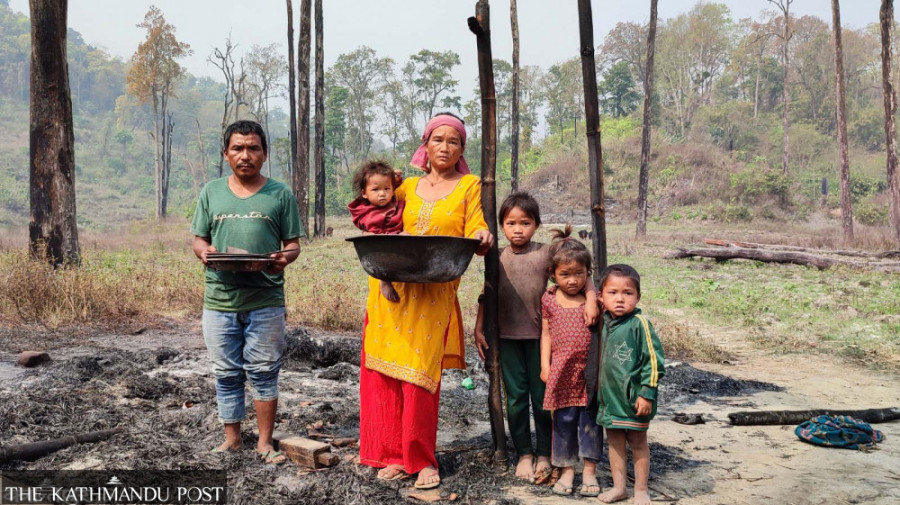
Ramesh Kumar Paudel
The Chitwan National Park on Sunday afternoon torched Kajiman Chepang’s hut in Kusumkhola in the park’s forest area. Kajiman is the same person whose hut was burnt down on July 18, 2021, for which the national park had received criticisms from various quarters.
Last year the park administration had set ablaze huts belonging to Kajiman and one of his neighbours stating that the huts were built by encroaching on the national park’s forest area.
This time, the park burnt down around a dozen huts in the area, including that of Kajiman, on Sunday while some other huts were demolished.
Ganesh Prasad Tiwari, the information officer at the CNP, said that the park administration took action as the huts were rebuilt in the previously evacuated area.
“Fifteen huts were demolished in Kusumkhola. The park administration was forced to take action as people had started building huts in the area again. We are yet to get information regarding how many huts were burnt and how many others were demolished,” said Tiwari.

The CNP claims that some people are attempting to encroach on the park’s area by building huts to stake claims on the land rather than for the purpose of living there.
“Some people went back to Kusumkhola and built huts there hoping that the government authorities will distribute land ownership certificates to them,” said Haribhadra Acharya, chief conservation officer at the CNP.
“We have been patrolling the area and urging them not to build huts inside the park. The park administration was then forced to remove the huts since the encroachers refused to comply. But the direction was only to demolish the huts and not burn them to the ground,” said Acharya.
According to a report prepared by Madi Municipality four years ago, there were 160 houses of landless people in the Kusumkhola area. The municipality in the last two years has resettled most of the squatters to other locations. According to Madi Municipality Mayor Thakur Dhakal, the local unit has built a total of 192 houses for the resettled squatters.
Kusumkhola lies in Ward No 9 of Madi Municipality in Chitwan district. The settlement, which is in a remote part of the municipality, is mostly inhabited by landless people, especially those displaced by floods and landslides across the country over the years. The squatters in the area come from Tanahun, Dhading, Makawanpur and the hilly regions of Chitwan and have been living there since 1992. Mainly people from Chepang, Tamang and Bhujel communities have been staying in the Kusumkhola area.
Madi Municipality has resettled the landless squatters from the Kusumkhola area to Pyuli, Thori, Raidanda, Paruikhola and Shivadurbar. Almost all the families in Kusumkhola went to the relocated areas, except Kajiman’s.
Kajiman had built another hut near his previous hut. According to the park administration, other people had also started returning to Kusumkhola after Kajiman refused to leave the area.
The park administration on Sunday also torched Nandalal Bhujel’s hut, which was built a few metres away from Kajiman’s hut. Nandalal and his wife were out to collect fodder leaving their children at home when the park employees burnt his hut.
“We hurried to the hut after we came to know about the incident. The hut was burnt to the ground by the time we reached there,” said Nandalal. “All our belongings have turned to ashes now. We have been staying in Kusumkhola since 1992 but the park is trying to remove us now.”
According to Nandalal, his family along with other settlers had been relocated to other places under the municipality’s resettlement plan but his family moved back.
“This month alone the park employees came here twice to remove us. But I have told them I will only move when they provide us with six katthas of land and a concrete house,” said Nandalal.
There were around 14 temporary shelters near Nandalal’s house. A little further towards Kalikhola, there were three more while four to five shelters were under construction near Kajiman’s house.
A little distance away from Kusumkhola, Badarjhula has been seeing settlers move to the area over the years. Although the national park lists Badarjhula within its territory, the local administration has begun issuing tokens to distribute land ownership certificates to the settlers.
This has prompted the old settlers of Kusumkhola to return to the area in the hopes of getting land ownership certificates, says Acharya, chief conservation officer at the CNP.
“The Supreme Court had ordered all tiers of governments to refrain from evicting squatters from their shelters after last year’s incident. So we coordinated with the municipality to relocate Kajiman and his family by making arrangements for him outside the park premises. But Kajiman refused to move,” said Acharya, chief conservation officer at CNP. “Since he refuses to leave Kusumkhola, others are also coming back to build huts there.”
Meanwhile, chairman of ward 9 of the municipality Shivahari Subedi says the park’s move to set ablaze the shelters was unwarranted.
“Aside from old settlers, new people had also started to come to the area seeking shelter in the past year. The park administration should have coordinated with the local representatives to find an amicable solution rather than burning the shelters,” said Subedi.
According to Madi Municipality Mayor Thakur Dhakal, the relocation efforts of the settlers were undertaken after an all-party meeting had decided that Kusumkhola was not suitable for human settlement.
Dhakal said that since Kajiman is still residing in the area, new people from other districts are bound to come and those who were already there are not willing to leave.
“We are still firm on our decision that the area is not suitable for human settlement. However, the park officials should not have gone to the extent of setting the shelters on fire. Their actions are deplorable,” said Dhakal.




 9.89°C Kathmandu
9.89°C Kathmandu1.jpg)
